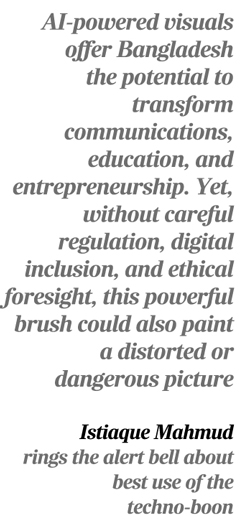
Published :
Updated :

In a digital-first era, artificial intelligence (AI) has become a game-changer in how we create and consume visual contents. From text-to-image generation to hyper-realistic video synthesis, AI's growing capabilities offer new creative frontiers. Yet, like a brush with two ends, this transformative force brings both vast opportunities and pressing challenges-particularly for a developing country like Bangladesh.
Bangladesh, with its youthful population and fast-growing digital ecosystem, stands to gain significantly from AI-driven image and video generation.
This latest wonder of technology is empowering small players to rub shoulders with the biggies in the game. Traditional content production can be costly and complex. AI tools are levelling the playing field, enabling small businesses, NGOs, and individuals to create high-quality visuals for marketing and advocacy with minimal resources.
Artificial intelligence comes out as fuel for the emergent gig economy. With a robust freelance community, AI enhances the skill-sets of Bangladeshi freelancers. A designer in Mymensingh can now generate concept art or animated assets for global clients, opening up new income streams and increasing foreign remittances.
Language barrier is scaled. It facilitates language-specific content creation. AI's ability to process Bengali allows for swift production of culturally relevant videos-from public-service announcements to educational content. Platforms that convert Bengali scripts into synchronised animations are making digital storytelling more accessible than ever.
Cost-effective marketing is another boon. For SMEs, AI offers affordable alternatives to traditional advertising. Businesses can generate multiple ad creatives, test visual variations, and customise content for targeted audiences-all within tight budgets.
Demerits: ethical risks and structural gaps: While the benefits are compelling, the rapid adoption of AI in visual-content creation also exposes vulnerabilities-many of which are particularly acute in Bangladesh. Deepfakes and disinformation present the monstrosity of this epoch-changing invention. AI-generated deepfakes pose serious threats, especially during politically sensitive periods like elections. Misleading videos and images can spread falsehoods, stoke communal tensions, or defame individuals-easily going viral among a population still developing digital literacy.
Regulatory vacuums, in this case, prove to be detrimental to norms. Although Bangladesh has initiated policy efforts such as the draft National Artificial Intelligence Policy 2024 and the Cybersecurity Ordinance 2025, these frameworks remain vague. Critical issues like transparency, ethical use, data protection, and accountability for AI-generated content have yet to be clearly defined, leaving room for misuse.
Digital divide: Urban-rural disparities in internet access, hardware availability, and digital skills may deepen inequality. While AI tools are becoming user-friendly, many still lack the infrastructure or training to use them effectively.
Job-displacement risks are rife, too. The growing reliance on AI-generated visuals could reduce demand for human creatives. Freelancers in photography, design, and videography may find themselves undercut by faster, cheaper AI alternatives.
Copyright and IP conflicts: AI systems often train on datasets without proper consent or attribution, raising questions about content ownership. In a country where copyright enforcement is already weak, this adds another layer of complexity.
Bias in AI outputs: If AI models are trained on non-representative data, they may reinforce stereotypes or misrepresent Bangladesh's ethnic, cultural, and socioeconomic diversity, leading to exclusion or distortion in generated content.
Way forward: responsible integration for a smart Bangladesh
To harness the full potential of AI while mitigating its risks, Bangladesh must pursue a strategic and ethical path. This necessitates building a robust legal framework. A comprehensive AI law is essential, with clear provisions on deepfakes, data privacy, content accountability, and ethical development. An independent AI regulatory authority could oversee implementation.
Promoting digital literacy and AI education is imperative. Nationwide campaigns and curriculum integration can help citizens critically assess AI-generated content and protect themselves from misuse. Special focus should be given to marginalised communities.
Encouraging human-AI collaboration is seen as a must-have for a balanced development. Rather than fearing job loss, Bangladesh should train creative professionals to use AI as a tool that enhances their work, not replaces it. Upskilling initiatives will be vital in maintaining human relevance.
As such, it is imperative to ensure ethical AI development. AI research must emphasise fairness, transparency, and data privacy. Local datasets should reflect the country's diversity to ensure inclusive outputs.
And last, but not least, is the urgency of strengthening global partnerships for a shared march forward. Collaboration with AI-advanced nations and international organisations can help Bangladesh access best practices, technical expertise, and policy models.


 For all latest news, follow The Financial Express Google News channel.
For all latest news, follow The Financial Express Google News channel.